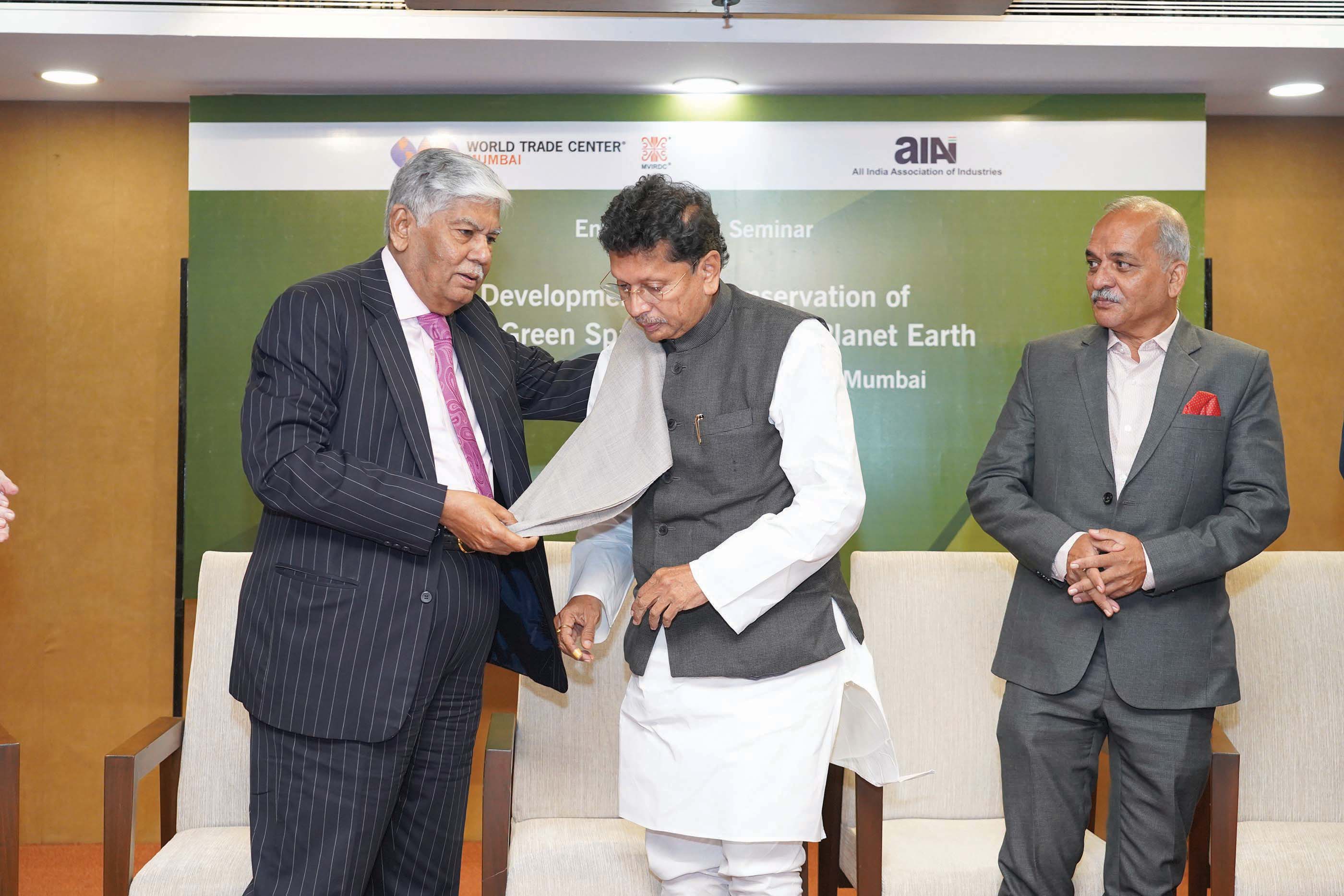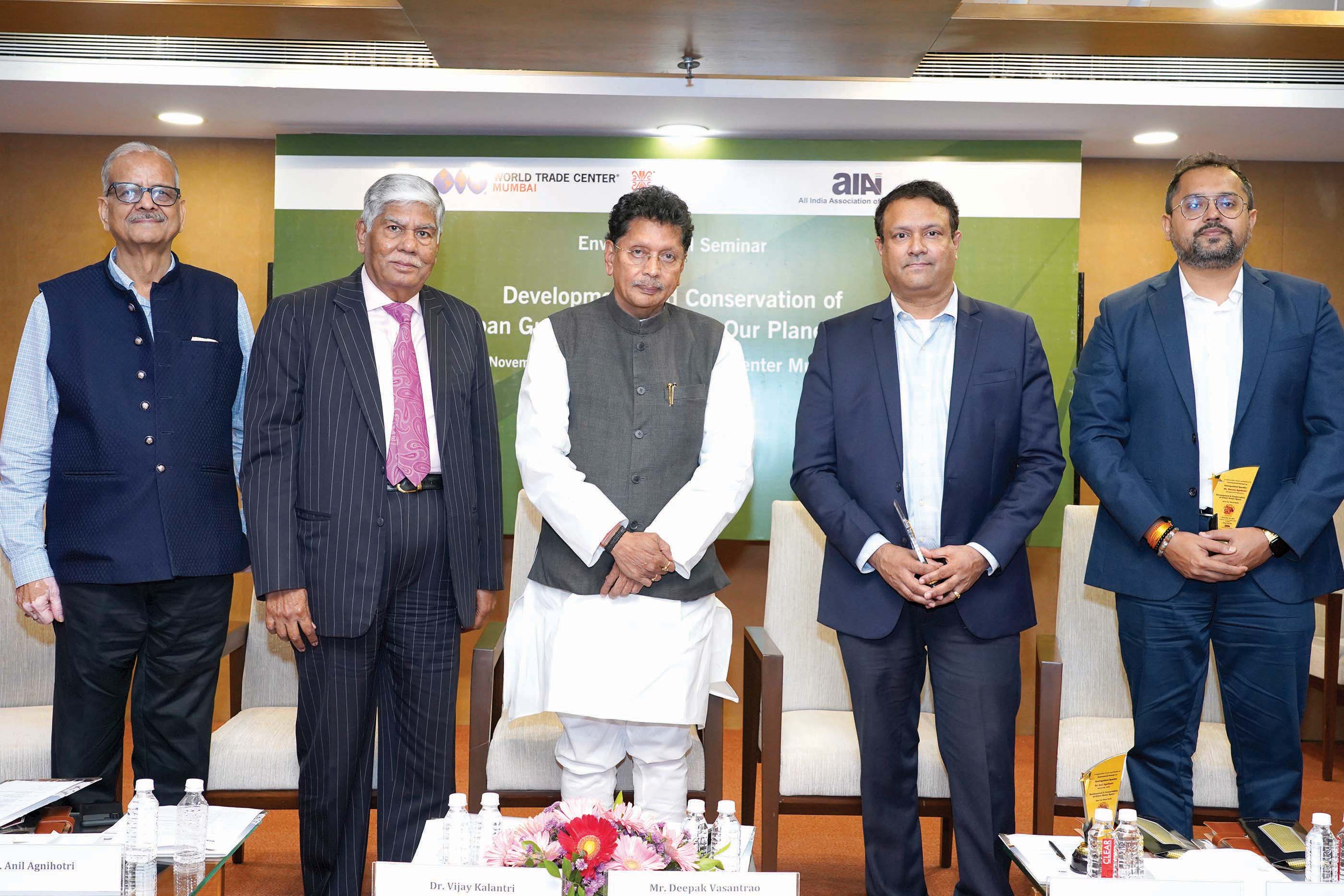Sustainable cities and communities is the 11th Goal under the UN Sustainable Development Agenda 2030 and governments across the world are taking measures to make their cities environmentally sustainable,
economically vibrant and socially inclusive. Urban green space plays an important role in mitigating environment pollution in urban areas and increase quality of life of residents. MVIRDC World Trade Center
Mumbai and All India Association of Industries (AIAI) organised a Seminar on ‘Development and Conservation of Urban Green Space’ to discuss strategies to improve quality of life and mitigate environment pollution.
Mr. Deepak Vasantrao Kesarkar, Hon’ble Minister of School Education and Marathi Language, Government of Maharashtra delivered special address at the event. Mr. Kesarkar informed, “I extend all possible cooperation,as a
guardian Minister, to achieve our mission of Clean Mumbai, Green Mumbai and Healthy Mumbai. As an environment friendly initiative, I have sanctioned funds for setting up kitchen gardens on the terrace of 500 schools in
the city from the District Planning Development Committee (DPDC). The state government has given clear direction to the Brihanmumbai Municipal Corporation (BMC) to preserve all reservoirs, including under-ground
reservoirs, hanging garden, trees and existing heritage structures. We have reclaimed 170 acre buffer land from sea under the coastal road project. We will use this land for creating green space to protect
environment and scenic beautification.”
The Hon’ble Minister also mentioned that the state government is implementing around six air purification technologies on a trial basis, with the support of IIT Bombay. He informed, “We are deploying air
purification filters on BEST buses and identified traffic congestion squares to install similar air purification filters. Such filters are also being implemented in six public parks. We have also mandated all
construction sites to have water sprinkling and fogging guns.”
Mr. Kesarkar invited Hygenco, a green hydrogen manufacturing firm, to set up green hydrogen plant in Sindhudurg district by using the huge water resource available on the bunds constructed near the Sahyadri hills.
“The ample water resource available in the Sahyadri belt can be used for producing green hydrogen, which can be an ideal model for green hydrogen manufacturing in Maharashtra,” he remarked.
The Hon’ble Minister further informed that the state government has involved 34 lakh school students in the second phase of the Swachhata Monitor scheme for segregation of municipal solid waste. The state government
is also working on setting up sewerage treatment plants (STPs) to treat sewage water before it is released in the sea.
Mr. Kesarkar advised the residential societies in Mumbai to set up waste treatment facilities on their vacant space to mitigate environmental pollution.
Earlier in his welcome remarks, Dr. Vijay Kalantri, Chairman, MVIRDC WTC Mumbai and President-All India Association of Industries (AIAI) mentioned, “Air pollution is the principal cause of death among children and
adults in the country. The state government and the municipal administrations should take long term measures to protect our future generation from air pollution. Municipal waste should be safely transported to
landfill to prevent air pollution. The state government may provide viability gap funding (VGF) to private companies for implementing waste management projects. Also, land should be allocated for setting up
waste to energy plants and concession agreements should be finalized without delay for such projects. India can also partner with Russia, which has developed new technology for converting waste
into green hydrogen.”
Dr. Kalantri further suggested, “All state governments should follow the Urban Green Guidelines, 2014 of the union government in letter and spirit to mitigate pollution. These guidelines recommend 10 to 12 sq.mt.
of open space per person in every city. Government should also prevent unauthorized felling of trees and diversion of green space for development projects.”
Speaking on this occasion, Dr. Anil Agnihotri, Expert on Energy Recovery, suggested the setting up of small bio-methanation plants in different parts of Mumbai to process a few hundred tonnes of municipal
solid wastes. Dr. Agnihotri mentioned, “Large cities such as Mumbai and Delhi generate 10,000-12,000 tonne of municipal solid waste per day, which can be treated using bio-methanation plants and converted
into cooking gas and organic fertilizers. State government should establish de-centralisedbiomethanation plants in different parts of the city where waste is generated so that they can be treated on the spot.
Biomethanation plant is a better alternative than setting up incinerator plant, which generates flue gas that pollutes atmosphere.
For the first time, the MSW (Solid Waste Management Rules, 2016) emphasized bio-methanation for treatment of segregated organic municipal solid waste as the waste generated in India is abundant in organic content
with high moisture and low calorific content.
In his remarks, Mr. Gaurav Agnihotri, General Manager, The Hydrogen Company HYGENCOshared information about the potential for India to attain self-reliance in the energy sectorby harnessing green hydrogen.
He informed that HYGENCO has set up state-of-the-art, fully autonomous green hydrogen pilot plant at Ujjain in Madhya Pradesh in 2022. HYGENCO is the only company In India with two long term green hydrogen offtake
agreements to supply green hydrogen to Jindal Stainless and Sterlite Technologies Limited. HYGENCO plans to invest more than USD 300 million (Rs. 2471 crore)in green hydrogen projects across India in the next three years.
During the event, Mr. Rajiv Agnihotri, Founder & President of SOPE gave an overview of Save Our Planet Earth (SOPE), which is an International NGO originally
founded in Mauritius in 2011 and with operations both in India and Kenya.
Mr. Agnihotri mentioned, “In the last decade, the organization has contributed to conserve urban green spaces, tree planting, beach cleaning, solid waste management, environmental education initiatives, reclamation of
degraded lands etc.”
The event was attended by members of trade & industry, think tanks, NGOs, financial institutions and academia.



 : +91 7718886506
: +91 7718886506